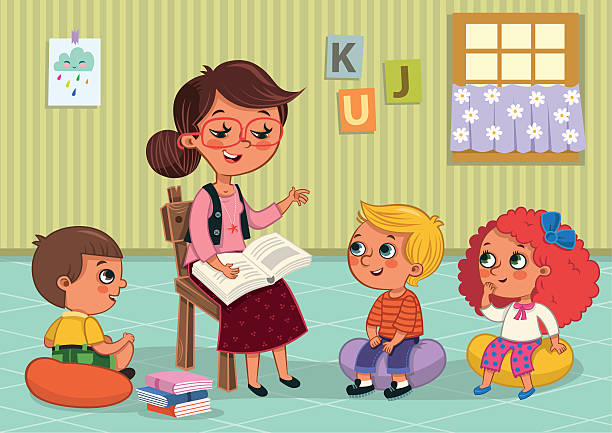
Building Bonds: The Crucial Relationship Between Children and Nursery Teachers

The bond between children and nursery teachers is one of the most essential relationships in early childhood development. During these formative years, children rely heavily on the guidance, support, and emotional warmth provided by their teachers. The way these connections are formed and nurtured can significantly impact a child’s social, emotional, and intellectual growth. Understanding this critical relationship helps both parents and educators ensure children get the most out of their nursery experience.
This article explores why these bonds are important, how they can be strengthened, and real-life examples of success. By the end, you’ll understand just how crucial the relationship between children and nursery teachers truly is, and how to foster it effectively.
The Importance of Bonds Between Children and Nursery Teachers
From the moment a child steps into a nursery, they are entering a world of exploration, learning, and socialization. It is during this period that they begin forming relationships outside of their family, and the connection with their nursery teacher becomes pivotal.
Emotional Security and Trust Building
One of the most crucial aspects of the relationship between children and nursery teachers is the emotional security it provides. Young children, particularly those under five, often experience separation anxiety when first starting nursery. A supportive and caring nursery teacher becomes a stable presence, offering reassurance that they are in a safe and nurturing environment.
The development of trust is fundamental here. When children trust their teachers, they feel safe to explore their surroundings, interact with their peers, and express their feelings. Teachers who consistently respond to children’s needs—whether comforting them when they’re upset or celebrating their achievements—create an environment where children feel valued.
Promoting Social and Emotional Development
The bond with nursery teachers plays a vital role in social and emotional development. Children and nursery teachers who establish strong relationships help young learners understand the basics of interaction, such as empathy, sharing, and managing their emotions.
For instance, when a child feels upset or angry, a nursery teacher can model calming techniques and healthy emotional responses. By showing compassion and teaching problem-solving, teachers help children develop emotional intelligence—a skill that will serve them throughout life.

Academic Growth Linked to Teacher Relationships
The emotional bond between children and nursery teachers isn’t just important for feelings of security and social growth; it directly impacts academic learning too. Children who feel emotionally connected to their teachers are more likely to engage in classroom activities and enjoy learning. Research has shown that when children feel secure and valued, their curiosity and eagerness to learn increase.
Nursery teachers play a pivotal role in fostering an early love for learning, whether through storytelling, play-based activities, or structured learning experiences. By building trust and offering encouragement, they can motivate even the most hesitant child to participate.
How to Strengthen Bonds Between Children and Nursery Teachers
Forming a strong connection between children and nursery teachers requires intentional effort from educators, parents, and nursery staff. Here are some key strategies to foster these relationships:
1. Create a Warm and Inviting Environment
Children thrive in environments where they feel welcome. Nursery teachers can create spaces that are bright, colorful, and filled with interesting materials that encourage exploration. By making the classroom feel like a second home, children will be more likely to engage positively with their teachers.
Teachers should also ensure that their interactions are warm and approachable. Greeting children with a smile, using positive reinforcement, and being patient when addressing concerns or misbehavior help build a foundation of trust.
2. Establish Consistent Routines
Young children need routine. Predictability in the classroom helps reduce anxiety and fosters feelings of safety. When nursery teachers stick to a regular schedule—such as snack time, playtime, and storytime—children know what to expect, which increases their confidence and trust.
A teacher who is reliable and consistent in their responses to children’s needs also builds emotional security. For example, consistently comforting a child when they feel distressed strengthens the bond and demonstrates to the child that their emotions are valued.
3. Communicate Effectively with Parents
The relationship between children and nursery teachers is strengthened when parents and teachers are aligned. Open communication between parents and teachers helps ensure that both parties are on the same page when it comes to the child’s emotional and educational needs.
Teachers should make an effort to check in regularly with parents, providing updates on their child’s progress and discussing any concerns. This partnership reassures the child that both their home and school environments are supportive.
4. Use Play as a Bonding Tool
For young children, play is a powerful way to connect with others, including their teachers. Nursery teachers can use playtime as an opportunity to interact with children on their level, engaging in their games, listening to their stories, and participating in imaginative scenarios.
Through these shared activities, children develop positive associations with their teachers, viewing them as companions in learning and exploration. Play also allows teachers to observe children’s personalities and preferences, helping them tailor their teaching methods to each individual.
5. Provide Individual Attention
While group activities are essential, individual attention is key to forming strong relationships between children and nursery teachers. Spending one-on-one time with a child—whether it’s during storytime, a quiet moment, or a learning activity—gives teachers the opportunity to connect more deeply with each child.
In these moments, teachers can acknowledge the child’s interests, celebrate their successes, and provide emotional support. This individualized attention helps the child feel valued and understood, strengthening the teacher-child bond.
Real-Life Cases of Strong Teacher-Child Bonds
Case Study 1: Jamie and Miss Sarah
Jamie, a 3-year-old boy, struggled with separation anxiety when he first started attending nursery. He would cry each morning when his mother dropped him off. Miss Sarah, his nursery teacher, understood how crucial it was to build trust with Jamie. She made a point to greet him with a smile every day, gently encouraged him to engage in activities, and offered extra comfort when needed.
After a few weeks, Jamie began to look forward to nursery. He was more willing to participate in group activities, and his mother noticed he talked excitedly about Miss Sarah at home. By offering consistent reassurance and patience, Miss Sarah had successfully formed a strong, trusting bond with Jamie.
Case Study 2: Leah and Mr. Tom
Leah, a 4-year-old girl, was shy and hesitant to speak up in the classroom. Mr. Tom, her nursery teacher, noticed this and made a concerted effort to spend time with her during play-based activities. He encouraged her to express her ideas through creative play, and slowly, Leah began to open up.
Over time, Leah became more confident in sharing her thoughts with Mr. Tom and her classmates. The bond that had been built through patient interaction and individual attention helped Leah thrive socially and academically.
Checklist: How to Foster Strong Bonds Between Children and Nursery Teachers

Use this checklist to ensure the relationship between children and nursery teachers is as strong as possible:
- Warm Welcomes: Greet children with a smile each day.
- Positive Reinforcement: Praise children for their efforts and accomplishments.
- Consistent Routines: Maintain a predictable schedule to help children feel secure.
- Open Communication with Parents: Regularly update parents about their child’s progress.
- Engagement in Play: Join children in their games and imaginative play.
- One-on-One Time: Spend individual time with each child to foster a deeper connection.
- Emotional Support: Comfort children when they are upset and offer reassurance.
- Encourage Expression: Help children express their feelings and ideas through creative activities.
- Celebrate Small Wins: Acknowledge even the smallest achievements to boost confidence.
- Respect Individuality: Recognize and celebrate the unique personalities of each child.
The Long-Term Impact of Strong Relationships Between Children and Nursery Teachers
The bond between children and nursery teachers has long-lasting effects on a child’s development. When a child forms a positive relationship with their nursery teacher, they are more likely to experience the following benefits:
1. Higher Self-Esteem and Confidence
Children who feel supported and valued by their teachers develop a stronger sense of self-worth. This confidence helps them face challenges with resilience and assertiveness as they move on to primary school and beyond.
2. Better Social Skills
A strong teacher-child bond teaches children how to interact with others respectfully and empathetically. These social skills are vital for developing friendships and working collaboratively with peers throughout life.
3. Lifelong Love of Learning
Children who enjoy their early learning experiences tend to carry that enthusiasm into future educational endeavors. When nursery teachers cultivate a love for learning, they set the foundation for academic success.
In Summary: The Crucial Role of Children and Nursery Teachers
The relationship between children and nursery teachers is a key component of early childhood development. From emotional security to academic growth, the bond between a child and their nursery teacher sets the stage for future success. By creating a warm, supportive, and nurturing environment, nursery teachers can make a lasting, positive impact on the children in their care.
Through real-life examples and proven strategies, it’s clear that fostering strong relationships with young learners is not only beneficial but essential for their overall development. Whether you’re a parent or an educator, understanding the importance of this bond is the first step in helping children thrive in their early years.
Read Also: Top Nursery Promotion Strategies to Effectively Attract Families